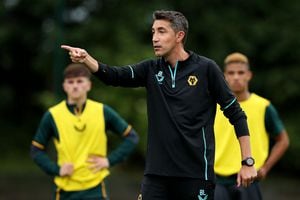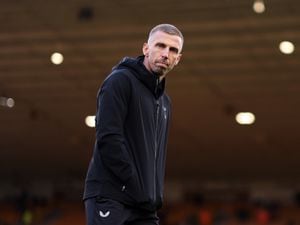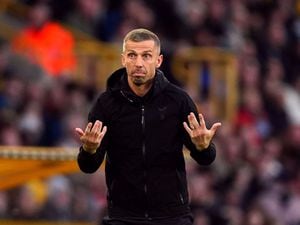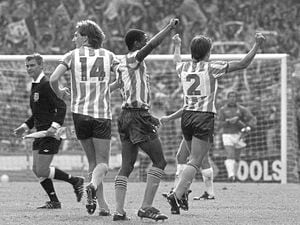Sky Sports' Johnny Phillips: Wolves boss Bruno Lage has to be willing to adapt
The pre-season work is still in its infancy for Wolves, but there is a gravitas attached to a European away fixture against Real Betis tonight that was missing from a trip to Crewe last Saturday.
The club sought a different direction under Bruno Lage after four hugely successful years under Nuno Espirito Santo.
When a new manager arrives at any club there is often talk about the football philosophy he brings, and this has certainly been the case in the wake of this particular appointment.
Supporters were frustrated by the last months of Nuno’s time at Molineux, particularly in the perceived cautious approach to the opening period of matches and the failure to extensively open up the opposition. In Lage they are hoping for a more attacking style.
Football philosophies are rather nebulous concepts. There has to be adaptation at any level of the game. Professional football is, and always has been, about winning matches.
The key to Lage’s success will surely lie more in his adaptability than any philosophy he employs.
It is a luxury for any manager to have just one philosophy and it could be argued that in no single game has one philosophy been the only way.
In a football context, Pep Guardiola’s is the name most identifiable with the word.
Ahead of last season’s Champions’ League final, the Manchester City manager was asked if he was under any pressure to win the trophy.
“The only pressure I feel here?” he responded. “To play your team like the way why you took over. You took over to play a certain way, you have to do everything this way.”
Looking across the Premier League last season, only Guardiola could afford one philosophy. The other managers had neither the wealth of resources nor the circumstances to pursue one way.
One of Guardiola’s former clubs are arguably now paying the price for being so wedded to a single idea.
Between 2008-12, Guardiola was able to perfect Barcelona’s vision of possession football. But even then he was helped by matters out of his control.
Xavi Hernandez, Andres Iniesta and Lionel Messi led an outstanding group of homegrown players, of a quality which no club had produced before.
Guardiola could not have succeeded without them.
At the Nou Camp, they have never really looked past that era, as if married to some pure ideals which perhaps came about when the stars aligned and cannot be easily replicated today.
More relevant to Wolves is the Andre Villas-Boas story. He arrived in England with a reputation as one of the dugout’s brightest prospects after one stunning, undefeated season at Porto.
At Chelsea, in 2011/12, the young Portuguese coach wanted to build his side around an attacking 4-1-2-3 system, with the ‘two’ in that formation able to break at any moment and destabilise opposition defences.
In theory it sounded exciting but in practice it led to gaps at the back.
There were heavy home defeats and an infamous failure to hold on to a three-goal lead against Manchester United at Stamford Bridge.

Senior players like Frank Lampard were benched or marginalised. Villas-Boas failed to adapt. As the season wore on he became a terse and testy presence in post-match press conferences. By March he had gone.
There will always be limits to how far managers feel they should adapt. When West Bromwich Albion were looking to replace Steve Clarke, midway through the 2013/14 season, Marcelo Bielsa was one of the candidates interviewed.
He outlined his initial plans for the squad which – to the surprise of the board – included replacing centre-halves Jonas Olsson and Gareth McAuley, who Bielsa believed were incapable of playing his way.
Ultimately, it was the Argentinian’s wage demands that proved the obstacle but it was a bold display of intransigence from a manager so confident in his own philosophy.
Nuno arguably perfected the balance between adaptation and philosophy in his first season in charge.
Reliable professionals like Dave Edwards, Jack Price and Nouha Dicko were jettisoned as they had no natural place in Nuno’s system, yet the head coach retained Conor Coady, Matt Doherty and Romain Saiss who had been no more effective than the aforementioned departures in the previous season. The three became key players in the revolution.
There will be more transfers in and out of the club over the next few weeks, but Lage will have to work with many of the players already in place.
Whatever beliefs or philosophy he wants to express, there must be an adaptation to the cards he has been dealt when he looks across at his squad on the pitches at Compton Park.
Lage appears to have begun his Wolves life with a different system to the one that characterised much of the previous era.
Nuno was always irked by talk of formations when anyone dared suggest his team lined up in a certain way. He was right to baulk at that on one level.
A formation is just numbers on a pitch until the ball starts moving. There are three principles that really matter when it comes to a playing style: the number of players available in possession, the space available to them, and the time it takes to move the ball.
Out of possession, the best teams recover the ball the quickest.
What worked for Lage at Benfica during the second half of their 2018/19 title triumph will not necessarily be transferrable to the Premier League.
It is imperative he successfully communicates his methods to the squad. Nuno achieved that buy-in early on during a hugely productive pre-season four years ago.
The early impression from the opening weeks of this pre-season is that Lage is good at getting his message across. A football philosophy is only of merit if it can be adapted to its surroundings.





